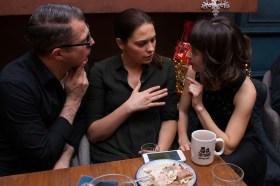Two-time Pulitzer Prize finalist and Harvard professor Steven Pinker, known as one of the world’s “most influential public intellectuals”, has announced his first Australian tour.
An Evening With Steven Pinker kicks off in Brisbane on 5 February 2026, followed by Melbourne on 6 February and Sydney on 7 February.
What Steven Pinker is known for
Pinker is the author of The Language Instinct (1994), How the Mind Works (1997), The Blank Slate (2002) and The Stuff of Thought (2007) – celebrated for making the most complex ideas accessible to a broad public.
In Enlightenment Now: The Case for Reason, Science, Humanism and Progress, he wrote: “As we care about more of humanity, we’re apt to mistake the harms around us for signs of how low the world has sunk rather than how high our standards have risen.” The book was published in 2018, at the height of Trump’s first presidency as a follow-up to The Better Angels of Our Nature that argued that violence has declined across human history thanks to the emergence of markets and states.
Pinker’s arguments about human progress have not always been met with agreement, many see his views as justification for the atrocities of contemporary society and yet, he is not one to shy away from controversy.
On his debut Australian tour, Pinker will explore the ideas in his latest book, When Everyone Knows That Everyone Knows (Penguin). The book delves into the hidden power of common knowledge, from diplomacy to protest movements, social trust to political change. Audiences will witness an evening with science and society, reason and rhetoric collide.
The tour is presented by Thinkable, and early access pre-sale starts 21 August with general public tickets on sale 26 August; learn more.
Discover more screen, games & arts news and reviews on ScreenHub and ArtsHub. Sign up for our free ArtsHub and ScreenHub newsletters.
Also on ArtsHub: Skibidi, work-spouse, mouse-jiggler: what Cambridge Dictionary’s new words tell us
More than 6,000 new words have been added to the Cambridge Dictionary in the past year. But when one of the world’s top dictionaries starts taking linguistic cues from a YouTube Shorts series featuring a floating head in a toilet, you might be forgiven for thinking we’ve reached a cultural low ebb.
That said, the word in question that appears in the viral YouTube series – ‘skibidi’ – loosely defined as describing something ‘good’, ‘cool’, ‘bad’ and/or ‘surprising’ – is, compared to previous new slang of similar meaning, somewhat refreshing in style.
New words: skibidi
Skibidi’s three-syllable rhythmic intonation and phonetic allusions to the (jazz) words ‘scat’ and (swimwear item) ‘bikini’, feel decidedly playful when viewed alongside other recent slang to describe ‘good/ bad’ things – such as ‘slay’ and ‘kill’.
Yet Cambridge’s 6000+ new words also contain a terms few that reveal more sinister undertones of our world today (and potentially our lives tomorrow).
New to Cambridge’s pages are the words ‘broligarchy’ (with the person noun counterpart ‘broligarch’) and ‘delulu’ (delusional) – which, when placed together, paint quite a rather unnerving picture of our times.
Also new are a series of compound nouns describing our modern day work habits and relationships.
New words: mouse-jiggler
A ’mouse-jiggler’ for example, describes any device used by a worker to help them present a convincing facade of work and productivity (rather than being engaged in actual work and productivity).
In the Australian context, this term feels right on point as our government continues its flap about our nation’s persistently declining productivity and the slippery slope it is leading us to in terms of economic peril.
New words: work-spouses
As well as leaning on ‘mouse-jigglers’, we are also apparently increasingly turning to ‘work spouses’ – a term included in Cambridge for the first time to describe the dependable relationships we might form with certain colleagues in the workplace whose trust we value in similar ways to a spousal partner.





